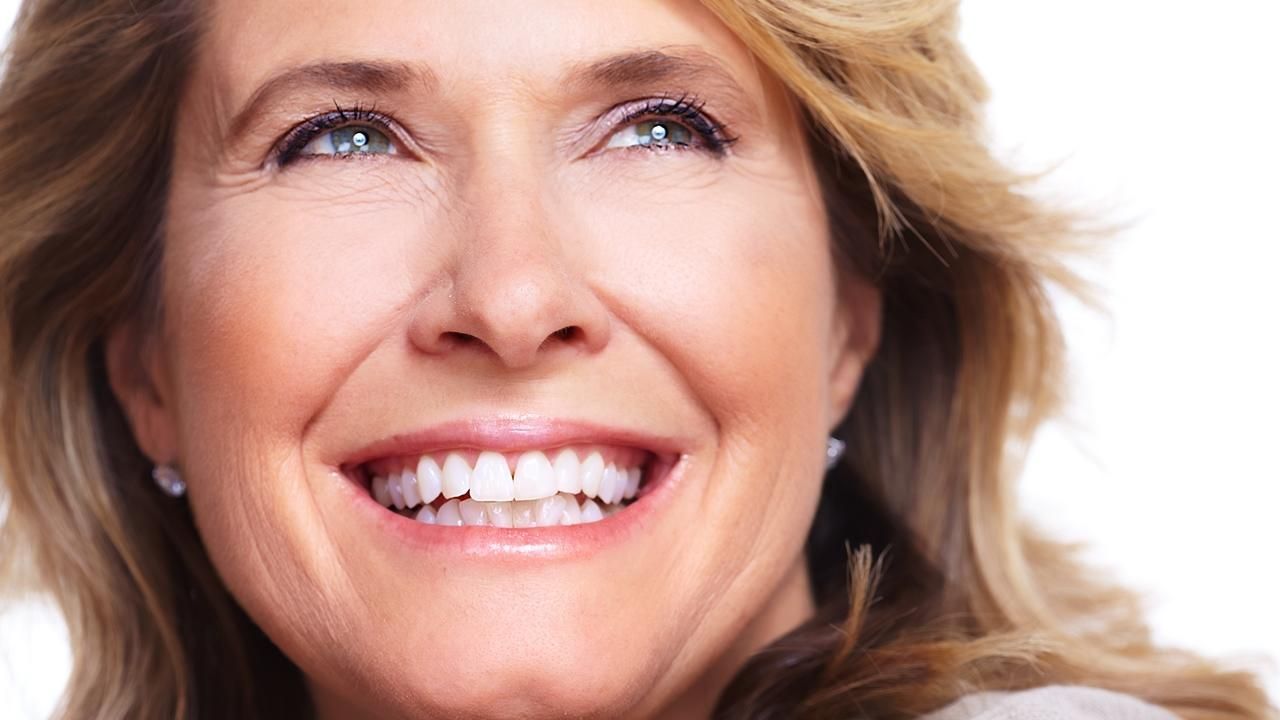Ageing Skin and Menopause

Although ageing skin is not a disease or a medical condition that requires treatment. It is something that worries many women and can impact on their self-esteem and mental health.
Hormonal changes during menopause also affect your skin. With the reduction of estrogen happening faster than testosterone adult acne can occur. This is because testosterone stimulates sebaceous glands to produce thicker sebum that can cause oily facial skin and acne. Relative testosterone dominance (higher ratio but not necessarily high reading) is also the cause of those unwanted new chin hairs.
The reduction of estrogen causes fat redistribution. Increased fat deposits around your abdomen, hips, and thighs and away from other areas like your face, neck and breasts. The reduction of these supportive fat deposits in these areas causes sagging skin, wrinkles and line development.
Estrogen reduction is also responsible for the reduction of collagen levels and elastin levels. Collagen and elastin are also less able to repair themself without the stimulation of estrogen. Collagen provides your skin with structure while elastin allows your skin to stretch and move. The reduction of these two proteins encourages the sagging and aging of your skin.
Glycosaminoglycans are essential for skin hydration as they increase water retention in the skin. As estrogen levels reduce so do these and your skin starts to become drier in general as it can not maintain hydration in the skin.
The epidermal layer of skin starts to thin. This is due to the reduction of blood capillaries that provide oxygen and other nutrients to the skin. The growth and maintenance of the blood capillaries are linked with estrogen levels. Therefore your skin becomes thinner and drier and more prone to damage. This damage takes longer to heal as your skin isn’t receiving as many nutrients to encourage healing. This same process is occurring in your vagina and urinary tract, this is why you may also experience vaginal dryness and may be more at risk of urinary tract infections.
Have you started noticing tiny white dots on your arms or legs? Melanocytes are the cells that produce the pigment Melanin. These are the cells that give your skin the tanned look after spending time in the sun. Melanocytes are regulated by estrogen. Too little and you may start noticing a few white dots here and there on areas that have previously been exposed to the sunlight. Too much and you start developing skin pigmentation. Have you ever noticed the majority or pigmentation occurs on your face and hands, the two areas that have been exposed to sunlight the most over your life?
Healthy skin aging starts with the right diet and lifestyle factors. I would like to highlight the importance of a few factors such as drinking enough water! Eating enough protein. Protein is very important as its the starting block for building new collagen. You need an abundance of antioxidant-rich fruit and vegetables as these protect your skin from free radical damage. Key antioxidants include Vitamin A, Vitamin C, Vitamin D, Vitamin E, and Zinc. Vitamin A helps to keep the skin lubricated. Vitamin C is needed in the production of collagen. Vitamin D is critical for new skin development and repair. Vitamin E inhibits free radical damage. Zinc is another essential building block for new skin development and repair. You should also consume a lot of beneficial oils such as seafood, avocado, and eggs, good oils help to lubricate your skin from the inside out. If you are considering supplements, fish oils are good but seabuckthorn is better. Sea buckthorn has the added benefit of containing Omega 7. Not heard of Omega 7, this is particularly beneficial for lubricating dry skin, dry eyes and or a dry vagina. This section on skin health wouldn’t be complete if I didn’t mention probiotics. These good bacteria help improve the function and strengthen the skin's natural barrier.
Try your best to avoid inflammatory foods such as those you are sensitive or allergic to, processed foods and sugars. These cause free radical damage to your skin and are linked with dark circles under your eyes, loss of skin tone, puffiness, acne, lines, wrinkles, loss of facial contour, bigger pore sizes and inflamed red and itchy skin. Alcohol can also be detrimental to your skin health. Alcohol causes the small blood vessels in your skin to widen. This may cause the skin to flush and a sensation of warmth to occur. Over time this can lead to broken capillaries on your face, it's also linked to dull or discoloured skin, enlarged pores, skin sag, and dry dehydrated skin. Caffeine can also cause dehydrated skin.
Certain lifestyle factors also impact on skin health, the most notorious is smoking. Smokers have paler skin, more lines, and wrinkles than nonsmokers. This is partially due to reduced circulation caused by the nicotine. This results in fewer nutrients getting to the skin and a decreased ability of the skin to release its toxic waste products of normal cell metabolism and this makes smokers more prone to skin conditions.
Stress causes the hormone cortisol to be released into the bloodstream. Excess prolonged cortisol levels cause the skin to thin, wrinkle and make your blood vessels more visible under the skin.
A good night's sleep can help you feel refreshed and look radiant as well. It is needed to avoid eye puffiness. But most importantly it’s during sleep that the body including the skin cells repairs and recover.
Regular exercise shows in your skin too. Research has shown people who maintain their activity levels have thicker skin with increased collagen fibers. Collagen gives the skin its strength and flexibility.
Fun fact: the skin has been called the 3rd kidney because it removes almost as much waste material from the body each day as the kidneys themselves. Ageing skin can’t effectively remove these waste products anymore. Therefore it's very important to reduce the number of toxins you are exposed to in the first place.


